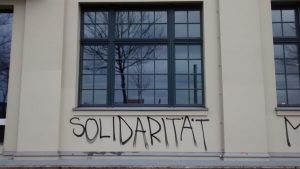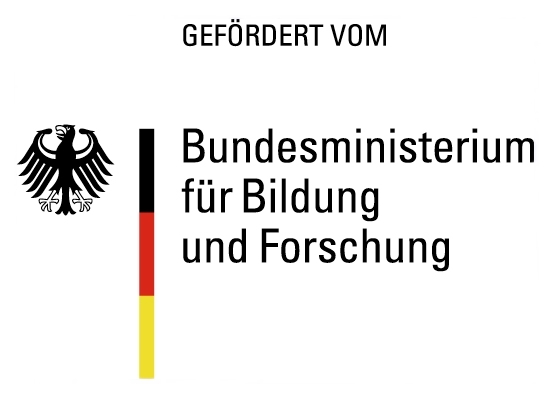english version below
Solidarität in der globalen Ökonomie (Philosophie/Geschichte)
Die Globalisierung hat die Weltwirtschaft in den vergangenen Jahrzehnten massiv verändert. Dies hat zu grundlegenden Veränderungen im Bereich der Produktion von Gütern, aber auch von Konsummustern geführt. Von diesen Veränderungen sind nicht nur Unternehmen, sondern Arbeitnehmer*innen und Konsument*innen betroffen. Auch wenn die veränderte Weltwirtschaft in manchen Regionen zu mehr Wohlstand geführt hat, so hat sie in vielen anderen Regionen zu neuen Formen von Ungerechtigkeit geführt. Im Mittelpunkt des philosophisch-historischen Projekts steht die Frage nach Solidarität im globalen Spannungsfeld von Produktion, Arbeit und Konsum. Die Ausgangsfragen lauten: Welches sind die ethischen Grundierungen des Globalisierungsprozesses? Welche neuen Formen von Solidarität und welche neuen Konfliktlinien innerhalb der Arbeitnehmer*innen entstanden angesichts der massiv erweiterten Konkurrenzsituation? Wann und warum entstand ein Bedürfnis nach „fairem“ Konsum? Was genau verstanden und verstehen unterschiedliche gesellschaftliche Akteur*innen unter „fair“ und „solidarisch“? Inwiefern können Formen solidarischer Praktiken als transnational bezeichnet und wie kann ihr Verhältnis zu politischen und ökonomischen Institutionen und Dynamiken charakterisiert werden? In den Blick kommen damit aus jeweils unterschiedlichen Richtungen die Folgen ökonomischer Verflechtung und neuer Standortkonkurrenzen zwischen Nord und Süd – und damit auch die schwierigen, oft ambivalenten Versuche ihrer Überwindungen.
Kosmopolitische Solidarität: Zwischen Markt, Konsum und Politik
Bearbeiter:
Alexander Heindl, Hochschule für Philosophie, München
alexander.heindl@hfph.de
Die Studie untersucht am Beispiel globaler Produktionsketten und Konsummuster die Herausbildung globaler Praktiken der Solidarität angesichts vielfältiger weltwirtschaftlicher Dynamiken. Die politischen Antworten auf veränderten Bedingungen und Prozesse der Weltwirtschaft bewegen sich seit zwanzig Jahren meist im herkömmlichen Rahmen politisch-philosophischer und politisch-theoretischer Ansätze. Diese Ansätze leiden erstens darunter, dass sowohl die konkrete globalisierte Erfahrungswelt der Betroffenen nicht angemessen reflektiert wird, und zweitens solidarische Praktiken, die sich jenseits liberaler Institutionen herausbilden (und diese oftmals sogar erst ermöglichen), nur am Rande thematisiert werden. Das Projekt setzt an dieser Stelle an und reflektiert die Bedeutung globaler solidarischer Praktiken hinsichtlich ihres Potenzials, aber auch ihrer Widersprüchlichkeiten.
Das Vorhaben will ein angemessenes politisch-philosophisches und sozialphilosophisches Verständnis globaler Prozesse entwickeln. Dabei gilt es, eine Verengung auf Akteure zu vermeiden, die dem westlichen Leitbild politischer Institutionalisierung entsprechen, und die Erfahrungswelten der Menschen in einer globalisierten Welt angemessen theoretisch zu verarbeiten. Hierzu sollen insbesondere zwei Traditionen herangezogen werden, die dieser Zielsetzung besonders entsprechen können: Zum einen die pragmatistische Tradition, mit der ein Begriff globalisierter Erfahrungswelten und ein weiter Politikbegriff begründet werden können. Zum anderen die poststrukturalistische Kritik an einer (neo-)liberal gestalteten Globalisierung. Beiden Ansätzen wird gegenwärtig innerhalb der philosophischen Debatte über Globalisierung und Kosmopolitismus (als politisch-philosophische Theorie der Gestaltung globaler Prozesse) mehr Aufmerksamkeit geschenkt. Daran anschließend sollen die ökonomischen Veränderungen globaler Produktionsketten und Konsummuster philosophisch reflektiert werden. Das Projekt zielt auf eine systematische philosophische Konzeption globaler solidarischer Praktiken und diskutiert die Frage, inwiefern ein bestimmtes Niveau solidarischer Praktiken als Ausdruck globaler, sozialer Relationalität Voraussetzung von Politiken globaler Gerechtigkeit oder Menschenrechtspolitik ist und welche motivationalen Aspekte damit verbunden sind.
‚Faire Arbeit‘. Solidarität und globale soziale Rechte in der Textil- und Bekleidungsindustrie, c.a. 1970-1994
Bearbeiterin:
Kornelia Rung, Universität Augsburg
kornelia.rung@philhist.uni-augsburg.de
Das Projekt fragt nach dem spannungsreichen Verhältnis von „globaler“ Produktion, „fairer“ Arbeit und „verantwortungsvollem“ Konsum. Es untersucht die Entwicklung der Textil- und Bekleidungsindustrie als Teil der globalen Verschiebung von Produktionsräumen, die massive Auswirkungen auf die Beschäftigten hatte und unmittelbar verbunden war mit unterschiedlichen Anstrengungen, ebendiesen Auswirkungen zu begegnen. Im Zentrum stehen nationale und internationale Textil- und Bekleidungsgewerkschaften, die Internationale Arbeitsorganisation (ILO) sowie unterschiedliche Nicht-Regierungsorganisationen der „Dritte-Welt-Bewegung“. Die Studie fragt mithin nach der globalen Wirkungsgeschichte textilindustrieller „Krisen“ und untersucht unterschiedliche Praktiken „internationaler Solidarität“.
Da die Entwicklung der Textil- und Bekleidungsindustrie seit den 1970er Jahren eng verbunden ist mit Konflikten um Standort- und Produktionsverlagerungen, desolaten Arbeitsbedingungen und Ausbeutungspraktiken von Arbeiter*innen und Kindern insbesondere in Asien, wurde sie schnell zum Streitfeld menschenrechtlicher Auseinandersetzungen. In diesem Rahmen fragt die Arbeit danach, wie unter den Bedingungen veränderter Produktionsketten und globaler Wettbewerbsstrukturen ‚Solidarität‘ verhandelt wurde. Dabei wird nach der Herausbildung unterschiedlicher Handlungskooperationen, den Entstehungsbedingungen von „fairer“ Arbeit und Produktion und der Historizität „sozialer Rechte“ im globalen Kontext gefragt. Was also konnte im Zeichen von Standortkonkurrenz und internationalem Wettbewerb ‚Solidarität‘ tatsächlich bedeuten? Welche konkreten Praktiken der Solidarität, also jener sozialen Praxis der Hilfe, Unterstützung und Verantwortung für die Betroffenen textilindustrieller Krisen, gingen von den unterschiedlichen Akteur*innen aus? Wo lagen die Dynamiken, Grenzen und Ambivalenzen internationaler Gewerkschaftspolitik und ihrer normativen Orientierung? Und welche Rolle spielte die zunehmende Moralisierung von Konsum- und Einkaufsverhalten, wie wir sie als Phänomen in zahlreichen Gesellschaftsbereichen seit den 1970er Jahren beobachten können? Dabei wird besonderes Augenmerk auf Prozesse der Solidarisierung gelegt; ein Begriff, der andeutet, dass Solidarität mit unterschiedlichen Betroffenen des Wandels in der Textilindustrie nicht im luftleeren Raum existierte, sondern Ergebnis eines Lern- und Aneignungsprozesses war. Der Blick auf Praktiken der Solidarität im Kontext der textilindustriellen Krise eröffnet damit die Möglichkeit, Gewerkschafts-, Konsum-, Unternehmens- und Sozialgeschichte zu einer Geschichte des Kapitalismus an der Wende des 20. Jahrhunderts zu verbinden.
Koordination:
Prof. Dr. Michael Reder, Hochschule für Philosophie, München
Solidarity in the Global Economy (Philosophy/History)
In the past decades, globalization has massively changed world economy. This has led to fundamental changes in the production of goods, but also in consumption patterns. These changes affect not only companies but also employees and consumers. Although the changed world economy has led to greater prosperity in some regions, it has led to new forms of injustice in many others. The philosophical-historical project focuses on the question of solidarity in the global field of tension between production, work and consumption. The initial questions are: What are the ethical foundations of the globalization process? Which new forms of solidarity and which new lines of conflict among employees emerged in the face of the massively expanded competitive situation? When and why did a need for „fair“ consumption arise? What exactly did different social actors understand by ‘fair’ and ‘solidary’ – and what do they understand by these terms today? To what extent can forms of solidarity practices be described as transnational and how can their relationships to political and economic institutions and dynamics be characterized? The consequences of economic interdependence and new location competition between North and South come into view from various perspectives – and thus also the difficult, often ambivalent attempts to overcome them.
Cosmopolitan Solidarity: Between Market, Consumption and Policy
Contact: Alexander Heindl, Munich School of Philosophy
Using global production chains and consumption patterns as examples, this study examines the emergence of global practices of solidarity in the face of diverse global economic dynamics. For twenty years, the political responses to changed conditions and processes of the world economy have mostly stayed within the conventional framework of political-philosophical and political-theoretical approaches. However, these approaches firstly suffer from the fact that the concrete experiences of those affected is not adequately reflected upon. Secondly, practices of solidarity that emerge beyond liberal institutions (and often even make them possible in the first place) are only marginally addressed. The project starts at this point and reflects on the importance of global solidarity practices in terms of their potential, but also their contradictions. The project aims to develop an appropriate political-philosophical and social-philosophical understanding of global processes. For this purpose it is important to avoid narrowing the focus to actors corresponding to the Western model of political institutionalization, and to process people’s real-life experiences in a globalized world in an appropriate theoretical way. The study will use two philosophical traditions particularly suited to this objective: On the one hand, the pragmatic tradition with which a concept of globalized worlds of experience and a broad concept of politics can be founded. On the other hand, the poststructuralist critique of a (neo-)liberal globalization. Both approaches are currently being given more attention within the philosophical debate on globalization and cosmopolitanism (as a political-philosophical theory of shaping global processes). Subsequently, the economic changes of global production chains and consumption patterns will be philosophically reflected upon. The project aims at a systematic philosophical conception of global solidarity practices. It discusses the question to what extent a certain level of solidarity practices as an expression of global, social relativity is a prerequisite for policies of global justice or human rights policy and which motivational aspects are associated with it.
‘Fair Work’. Solidarity and Global Social Rights in the Textile and Clothing Industry, ca. 1970-1994
Contact: Kornelia Rung, Augsburg University
kornelia.rung@philhist.uni-augsburg.de
The project asks about the tension-filled connection between ‘global’ production, ‘fair’ work and ‘responsible’ consumption. It examines the development of the textile and clothing industry as part of the global shift of production areas that has had massive effects on workers and has been directly linked to different efforts to counter these effects. The focus is on national and international textile and clothing trade unions, the International Labour Organization (ILO) and various non-governmental organizations of the “Third World Movement“. The study therefore examines the global impact history of the changing textile and clothing industry and different practices of ‘international solidarity’.
As the development of the textile and clothing industry since the 1970s has been closely linked to conflicts over relocation of production, desolate working conditions and exploitation of working women and children, particularly in Asia, it quickly became a field of human rights disputes. In this context, the subproject asks how ‘solidarity’ was negotiated under the conditions of changed production chains and global competitive structures. The project examines the formation of various collaborative actions, the conditions under which ‘fair’ work and production emerged, and the historicity of ‘social rights’ in the global context. What could ‘solidarity’ really mean in the face of international competition? Which concrete practices of solidarity, i.e. social practices of aid, support and responsibility for those affected by crises in the textile and clothing industry emanated from different actors? What were the dynamics, limits and ambivalences of international trade union policy and its normative orientation? And what role has the increasing moralisation of consumer behaviour played? Special attention will be paid to processes of ‘solidarisation’; a term suggesting that solidarity with the various people affected by changes in the textile and clothing industry did not exist in a vacuum, but was the result of processes of learning and appropriation. Looking at practices of solidarity in the context of the textile-industrial crisis thus opens up the possibility of linking trade union, consumer, company and social history to a history of capitalism at the turn of the 20th century.


